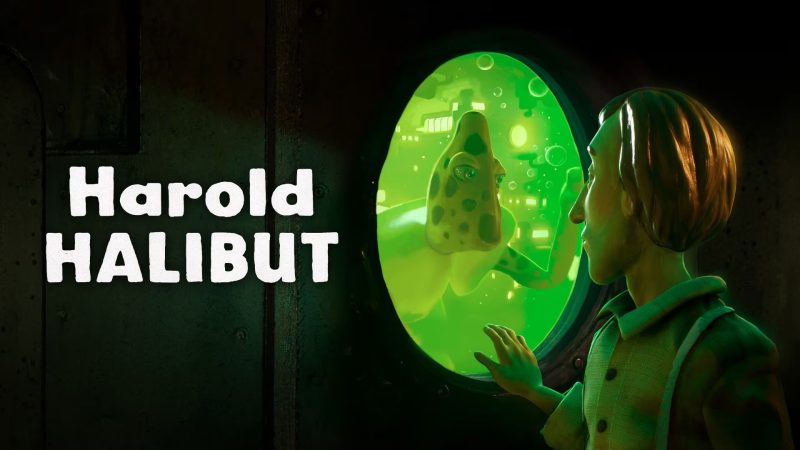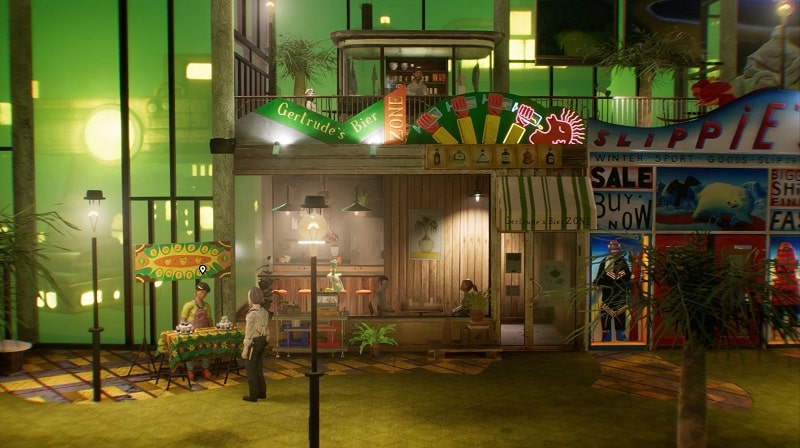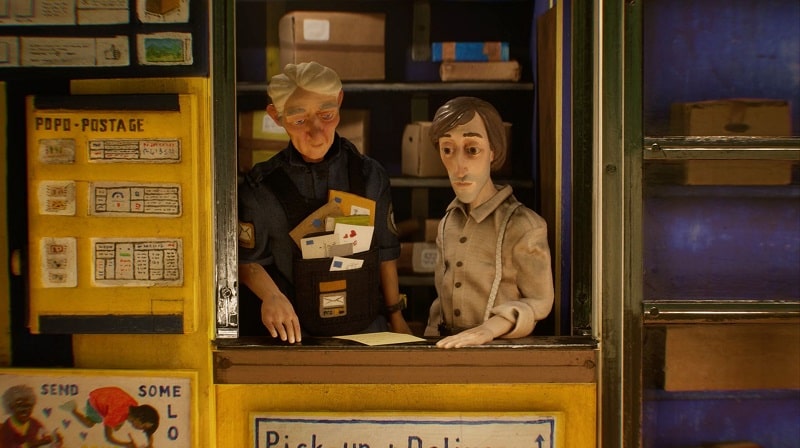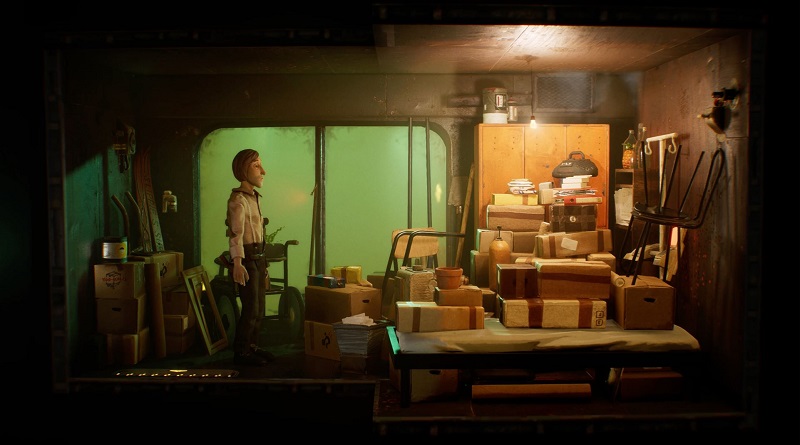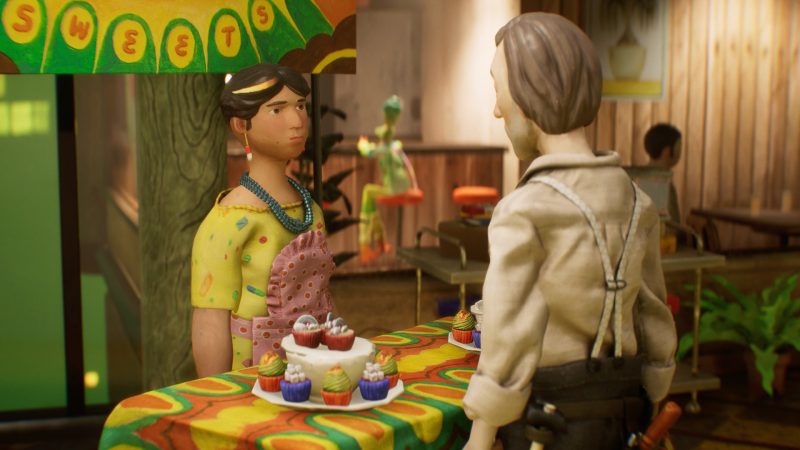Harold Halibut PS5 Review. It was around the time when I was standing inside of John Slippie, Jr.,’s winter sports goods store watching what was the latest in a seemingly long line of gaudy infomercials aimed at selling his wares, that it became apparent that we might be onto something here.
Ever the astute salesman, Slippie, Jr. has me sold on Harold Halibut and the experience had with its colourful cast of characters over the twelve-or-so hours it took to finish up its story.
Harold Halibut PS5 Review
Stop-Motion Comes To Life
The sum of a mammoth 10-year development, in no small part due to the manner in which it’s been crafted, Harold Halibut has emerged – or perhaps more fittingly, submerged – from its stop-motion roots and it’s about time, too.
What will immediately become obvious upon booting the game up, or indeed by glancing at a trailer, is just that; how Harold Halibut looks. Think of Aardman Animation’s Wallace and Gromit with a sprinkling of Chicken Run and you’re on the right track. The game’s world and characters have been painstakingly modelled in real-life before then being 3D scanned into the game. The result is quite spectacular – a rich, tactile world which has managed to translate an animation and art style near-seamlessly.
Set primarily abroad the FEDORA 1 spaceship some 250 years after its escape from an earth on the brink of annihilation, Harold Halibut’s focus is on that of the inhabitants as they go about their daily lives under the watchful eye of ‘All Water,’ a mega-corporation overseeing every nook and cranny of the stranded vessel.
Uncertain motives, repetitive PR messages via tannoys, complete control over the tube transport system, and an archaic rule set followed blindly by the dwellers, it’s got all the attributes of a relationship with a lot more give than there is take. For the titular protagonist Harold, mundanity is the name of the game, that is until a chance meeting with a cephalopod-type creature changes his immediate prospects and sets in motion a pursuit for life’s meaning beyond the confines of the ship.
Facing a new existential threat, both All Water and the ship’s rogue scientists work independently in order to stave off near-certain doom for everyone onboard. Given the former’s grip on life on the FEDORA 1, Harold Halibut follows what is ostensibly a day-and-night cycle dictated by the availability of the aforementioned tube system which connects the different parts of the ship to one another.
You have the likes of the Lab District, Energy District, and the Agora Arcades which acts somewhat like a hub area, with shops, food stalls, and a bar for Harold and company to congregate. Each day, then, bears out in familiar fashion – you have set main and optional tasks, accessed via your PDA, which is a handset-like system that allows you to view current objectives, receive text messages, and of course play Space Toast.
These tasks will typically require you to shuttle between areas in order to progress the narrative, meeting inhabitants and relaying news of some sort or fetching items, oftentimes at the behest of Jeanne Mareaux, the ship’s chief scientific mind. Other times, it’s driven more so by Harold’s own relationships and the need to keep up appearances in what is a small-scale community.
The movement itself is a little laboured which makes sense given the game’s animation style. It has you snap into place when initiating conversations which can be a little jarring but again not a particularly big deal. Adding to the tasks are that are the text messages; little supplement nuggets of information that Harold receives from time to time, again in service of layering on the narrative where possible.
Though classified as optional, there are a number of tasks which emerge organically from chance conversations, and in the context of wider-world building they perform an important role in fleshing out the background of both the ship and those within it. Many of these optional tasks add meat to the bones, as you’ll gain a better understanding into why the characters are the way they are and how the autocratic rule set imposed by All Water works in practical terms – no matter how peculiar it all may seem.
In fact, there’s a particular side task that illustrates this well, exhibiting all the hallmarks of what Harold Halibut is trying to achieve with its narrative. During the story you’ll encounter Buddy, the aptly-named mailman for the station. Throughout your encounters, Harold prods him with questions that he himself is searching for answers to; questions about life’s meaning, aspirations, and ultimately how and what one determines their purpose to be.
The side quest culminates in a manner which is quite affecting, and it acts as a through line for the game’s themes and the relationships between certain characters. All within the confines of the rules as established by All Water, naturally.
Of course, all of the above wouldn’t work nearly as well if it wasn’t for the quality of writing. For a game so focussed on interaction there’s thankfully a lot of good to be said in that respect. Quirky, cohesive, and tight, it all paints an engrossing picture. There’s even a This is Spinal Tap reference thrown in for good measure, amongst others.
Consequently, Harold Halibut hinges on its characters and how receptive you are as a player to their plights. The majority of voice performances are excellent and there is a deep sense of personality rooted in the FEDORA 1, and it is primarily expressed through these conversations, and in gameplay terms, menial tasks that may prove grating for some.
That’s where your mileage may vary. Though Harold’s journey is peppered with neat little flickers of gameplay in the form of say a brisk jog with Chris and Buddy or even some rudimentary analysis in the science lab, Harold Halibut is by and large fetch quest-orientated. For those looking for a more substantive gameplay experience, you’re not likely to find it as the principal focus is that of the narrative.
Tone is the important component here, and the game is never at pains to commit to a story with some real menacing undercurrent, nor does it necessarily need to. It may, for some, come off as a little aimless or plodding, especially when combined with the relative simplicity of what you’re actually doing, but the stakes and intrigue are there to push you forwards. Particularly if you engage with both the main and optional tasks, as well as the little conversations that can be partaken in which help in bringing weight to the world being built, too.
Further Reading – Upcoming PS5 Games 2024 – The Best PS5 Games Coming Soon
Speaking of the world, your exploration will, for a time, extend beyond the FEDORA 1 and into an alien commune, which in and of itself is a breath of fresh air, building upon the themes set out in the first half of the game, as Harold continues to question the rules by which he abides, both societally and as mandated by All Water, which are in stark contrast to that of his new alien equivalents.
What helps more generally, too, is the soundtrack – a fitting mix of ambient and area-specific jingles that I actually looked forward to hearing upon leaving the tube system. It’s just as well, considering you’ll re-visit the same locales repeatedly throughout the journey. Performance is steady too, and as we’ve come to expect, both a quality and performance mode are selectable. The latter is the obvious choice here, the extra frames come in handy given how the characters animate, and quality mode seems to exhibit some slight visual artifacting when compared to performance.
Simply put, Harold Halibut is a resounding success, stripping away some of the fat that can be seen in similar games of the genre. The degree to which that affects gameplay may negatively impact some impressions, but for others the story and writing alone should be more than enough to compensate. There’s a lot of heart here.
Though plaudits will be rightly levelled at its appearance, Harold Halibut is equally as impressive when it comes to its narrative, world-building, and how both are realised throughout the course of its story. Despite being relatively light in gameplay terms, the game packs a punch where it matters by sticking its landing and proving beyond doubt that the answer to the meaning of life may be closer to home than you think.
Harold Halibut releases on April 16 on PS5.
Review code kindly provided by PR.
